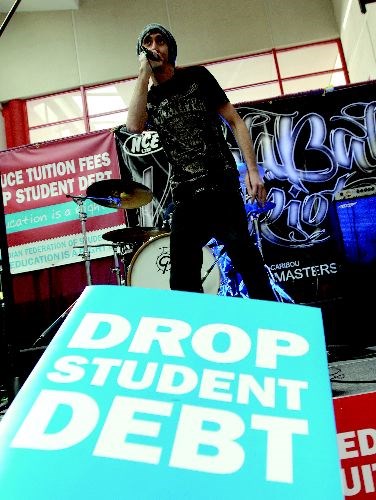It was a national day of action for post-secondary students, and Leila Abubakar wasn't holding back on who she thinks is to blame for the
rising costs of education.
The College of New Caledonia student union president had the B.C. government firmly in her sights Wednesday as she spoke to a crowd of sign-waving, popcorn-munching students gathered in the CNC atrium to vent their anger over the threat of yet another tuition increase.
"This is a cry for action [for] the government to either freeze tuition fees or reduce them or just give us more grants and take out interest on loans," said Abubakar, a business marketing
management student.
"We're getting a two per cent increase every year just because the government is not giving us enough core funding.
"The government has given a ridiculous amount of tax incentives to corporations. If they take out that money and move it to education we wouldn't have this problem."
CNC president John Bowman said last week he anticipates the college will be forced to raise
tuition costs by two per cent to deal with a projected $1.8 million shortfall.
Abubakar said per-semester tuition costs at CNC average between $1,200 and $1,500 for domestic students. As a foreign student from Kenya, she pays $6,500 per semester. That cost will rise to between $7,000 and $8,000 when she moves on to UNBC this fall to study environmental health.
"The fact is student debt is out of control, with over $15 billion in outstanding federal student loans," said Michael Olson, the B.C. representative for the
Canadian Federation of Students.
"It's something the government needs to take action on. Students are graduating in B.C. with an average of $27,000 in student loan debt and we're unable to participate fully in the student economy. If students are graduating with less debt and being higher educated, there's far more benefit to our society and to our economy as a whole."
CNC faculty president David Rourke said provincial politicians have lost sight of the value of post-secondary education. He said women who graduate from a college or university program generate on average $106,000 more over their working careers than women who have just high school diplomas, while college-educated men contribute an average $159,000 more.
"I encourage you to keep up the
battle," Rourke said. "The people in our government went to school and something must have changed between now and then because they don't seem to recognize the benefits of a
well-educated workforce."
Advanced Education Minister Naomi Yamamoto, in a phone interview, spoke against freezing tuition outright, as happened during the 1990s when the NDP was in power, saying the result was fewer courses and programs offered, fewer students gaining admission and students taking a longer to complete their programs.
However, she noted the Liberal government has capped tuition hikes at two per cent per year and B.C.'s average tuition has been the fourth lowest in
Canada for six straight years.
As for student loans, she said the
emphasis has been on assisting those who have completed programs.
"If you go to the Student Aid B.C. website, I think you'd be surprised at all the repayment programs we have," she said.
For example, $39 million was allocated to automatically reducing loans and benefited 21,000 students to an average of $2,200 each.
There is also a loan forgiveness program for graduated students who agree to work for three years in an under served B.C. community, Yamamoto added.
"We'll reduce their loans by one third the first year, another third the second year and then completely forgive their loan in the third year if they stay in that area and work."


